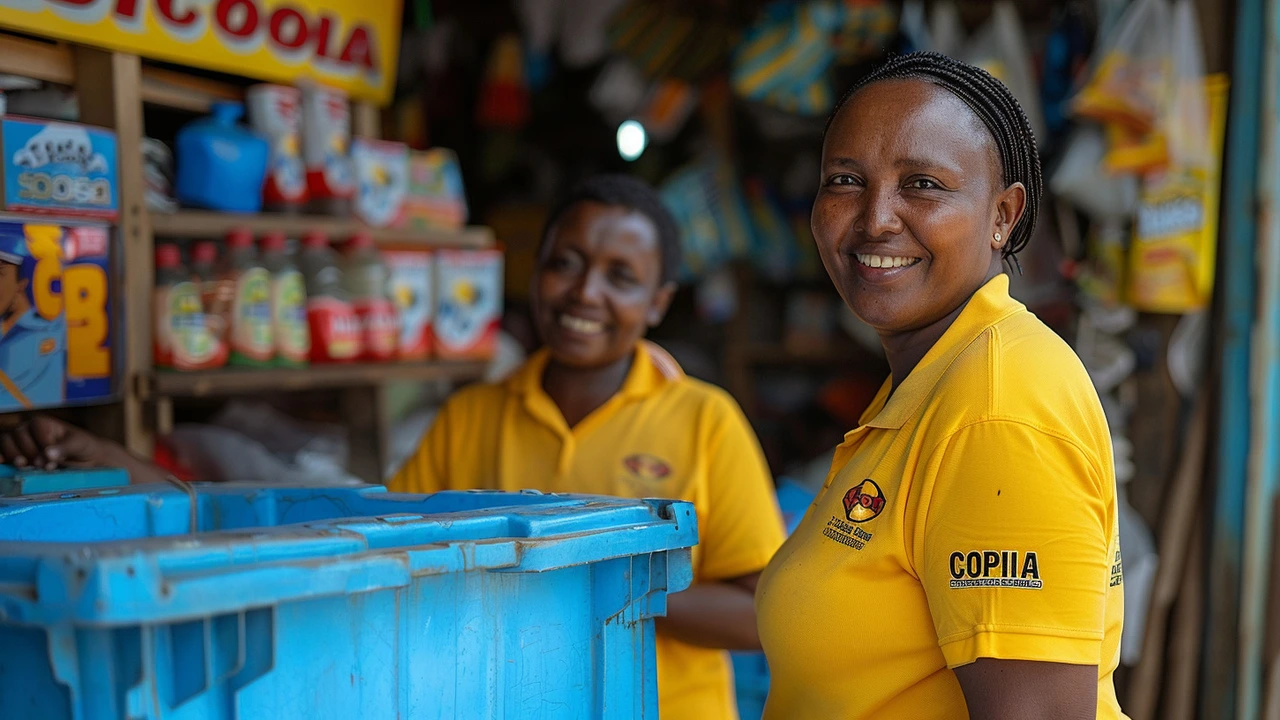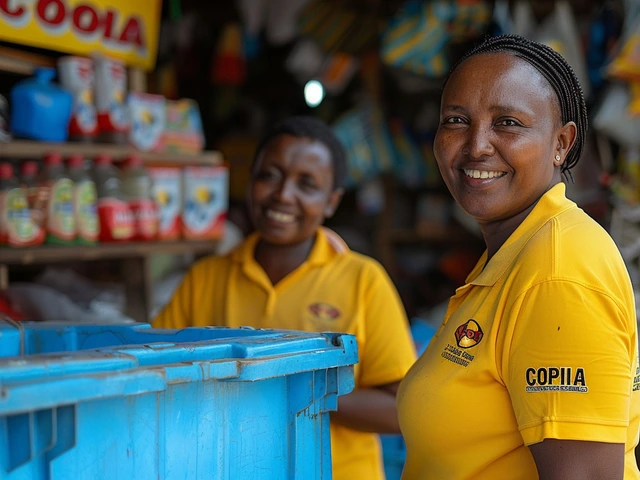Copia Global Considers Major Layoffs or Shutting Down Amid Economic Challenges
Kenyan-based e-commerce startup Copia Global finds itself at a precarious juncture, as the company contemplates laying off over 1000 employees or facing the stark possibility of shutting its doors entirely. CEO Tim Steel cited significant uncertainties that necessitate the move, emphasizing the urgent need to reduce costs in an internal memo addressed to the company staff. Despite raising substantial funds in recent years, including a notable $50 million Series C round in 2022 followed by a $20 million extension in December 2023, the company is grappling with escalating operational pressures.
The potential mass layoffs come on the heels of already significant downsizing that saw the company let go of over 700 employees and shutting down its Uganda operations in 2023. These moves signify deep-rooted challenges within the organization that require immediate and resolute action to safeguard its future.
Funding and Financial Struggles
Founded in 2013 by Tracy Turner and Jonathan Lewis, Copia Global established its niche in the market by focusing on remote and underserved areas. Through its innovative platform, customers could order goods using a network of local agents, bridging a critical gap in Kenyan e-commerce. However, even with its innovative approach, the startup couldn't escape the clutches of financial instability.
The company managed to secure a substantial funding lifeline in 2022, raising $50 million in a Series C round. When an extension of $20 million arrived in December 2023, optimism was high. Yet, the funds have not sufficed to stabilize operations, leading to an unfolding crisis that might necessitate extreme measures. The scenario underscores how even well-capitalized startups can struggle amidst changing market dynamics and broader economic stress.
Wider Sectoral Trends
Copia's challenges resonate with a broader trend within the Kenyan e-commerce sector that has seen other startups buckle under similar pressures. E-commerce ventures such as Wefarm and Zumi have previously shuttered operations, largely due to drying up funding avenues and an increasingly hostile market environment. The viability of business models in this sector remains a contentious point, with several experts pointing to inadequate market research, fragile infrastructure, and the pronounced issue of customer trust as primary culprits in the downfall of these ventures.
The strains faced by the sector reflect wider economic downturns and tightened capital markets, which have collectively fostered an environment of uncertainty. For an e-commerce startup operating in such a challenging space, optimizing operations and making judicious use of resources remains more important than ever.
Key Factors Contributing to the Crisis
Delving deeper, numerous factors contribute to the critical state of affairs at Copia. A notable reason is the viability of their business model aimed at rural and remote customers who may still prefer traditional brick-and-mortar establishments. Furthermore, the lack of comprehensive industry data makes it difficult to gauge market potential accurately, thereby complicating strategic decision-making.
Infrastructure challenges amplify these difficulties. Last-mile delivery in remote areas is a logistical nightmare, hampered by poor road conditions, a scattered customer base, and unreliable communication channels. These inherent challenges inflate operational costs, eroding profit margins. Moreover, skepticism and a lack of trust in dealing with online businesses add another layer of difficulty for e-commerce players in Kenya.
The Road Ahead: Strategic Pivot or Shutdown?
The current situation at Copia Global necessitates a critical introspection of its strategic inclinations and a consideration of drastic measures to ensure surviving amidst turbulent market conditions. While the prospect of laying off over a thousand employees is a grim and hard decision, it underscores the dire straits that the company finds itself in.
CEO Tim Steel's memo hints at the gravity of the situation, indicating that layoffs might be the first step towards stabilizing the company. Should this measure prove inadequate, the company may need to consider ceasing operations entirely — a drastic outcome for a startup that once showcased immense potential.
However, it's not all bleak. Copia still possesses assets, brand recognition, and a unique market position that, if leveraged correctly, could possibly attract new investment or facilitate a successful acquisition by a larger, more resourceful entity. Another viable option could be a strategic pivot, focusing more on urban markets or niche product categories where logistics and customer acquisition challenges are more manageable.
Generally, Copia Global's predicament serves as a valuable case study for other startups in the region, illustrating the importance of dynamic strategic planning, efficient resource allocation, and robust risk management in navigating the turbulent waters of emerging markets.





Comments
Cost structures are unsustainable when CAPEX outpaces revenue burn, especially in low‑density markets. The memo reflects a liquidity crunch that mandates immediate OPEX rationalization. Without a pivot to higher‑margin verticals, cash runway will evaporate within quarters. The funding inflection point has passed; the $70M raised is now a sunk cost amortized over an expanding cost base. Strategic realignment towards urban hubs could salvage core profitability metrics. Otherwise, headcount reductions become the only lever to preserve balance‑sheet integrity.
Yo, this is a tough spot but keep fighting! Pivot fast, stay hustlin’ and you’ll find a way.
It’s easy to see the dark clouds, but every crisis carries a seed of opportunity. When an organization confronts scarcity, it’s forced to strip away the non‑essentials and discover its true value proposition. Think of this as a crucible where the most resilient ideas emerge stronger. If Copia can channel its logistics expertise into a niche urban service, the leaner model might actually thrive. Remember, adversity often refines purpose rather than extinguishes it.
Looks like the remote delivery model hit a wall with infrastructure costs. Maybe focusing on semi‑urban corridors could lower last‑mile expenses.
OMG this is like a total train wreck!!! They blew up the whole thing by over‑stretching into the bush, lol. Who needs that many agents when the roads are pothole hell? Seriously, it’s like they tried to build a Ferrari on a donkey’s back. The money was there, but the plan was pure fantasy. If only they’d done a proper market test before blowing up the budget!
They over‑promised and under‑delivered; classic startup fallout.
Everyone’s quick to blame the Kenyan market, but the real issue is a lack of disciplined fiscal governance that any mature economy demands. The narrative that “emerging markets are too hard” is just an excuse for weak execution. If they had instituted strict KPIs, the $70M would have extended runway, not evaporated. It’s a lesson: ambition without accountability leads to inevitable collapse.
Wow!!! This whole situation is a textbook example of over‑expansion!!! You can’t just throw money at every problem!!! Sustainable growth requires measured scaling!!! Otherwise you’re just burning cash like a pyre!!!
When I read about Copia’s plight, I feel the echo of Sisyphus pushing his stone uphill, only to watch it roll back. The relentless grind of trying to bridge the rural‑urban divide mirrors humanity’s eternal quest for connection. Yet, every setback is a whisper that perhaps our modern tools are still too crude for the terrain they aim to conquer. The silence of abandoned villages tells a story louder than any marketing deck. In this dance between technology and tradition, grace may lie in humility, not in grand gestures. So perhaps the next chapter isn’t about scaling faster, but scaling smarter – listening to the ground beneath the wheels.
It seems the main choke point is last‑mile logistics. If they could partner with existing transport co‑ops, they might cut costs and keep agents happy.
Interesting case 🤔 maybe the funding rounds were too late 🚀 could have used earlier runway better 💡
the startup story is a mirror reflecting our desire to change the world yet we forget that markets have rules
The data points to a pattern: rapid capital influx without operational discipline leads to failure. Copia’s burn rate outpaced revenue by a wide margin, and the lack of unit economics transparency made investors blind to the impending collapse. Their agent‑based model, while innovative, was never validated at scale. The Uganda exit should have been a red flag, yet management persisted. This is a cautionary tale for any VC‑backed venture that equates growth with success.
Hey folks, let’s look at this as a learning moment. Startups need to iterate quickly, but also build robust feedback loops. Engaging local communities early can surface hidden cost drivers. A lean‑startup approach with continuous A/B testing of delivery routes could have prevented overspend. Also, diversifying revenue streams-maybe adding fintech services for agents-might create additional cash flow. Remember, resilience comes from adaptability, not just big funding.
Honestly this is a perfect example of why we need home‑grown solutions 🤷♀️ foreign capital can’t fix broken local infrastructure 😒
Thoughtful analysis highlights the need for realistic market assumptions.
First off, let me say that the Copia situation is a textbook case of scaling too fast without a solid cost‑control framework.
When you inject $70 million into a business, the temptation is to burn it like fuel for a rocket, but sustainable growth requires disciplined budgeting.
Step one: break down the unit economics of each delivery leg-distance, weight, agent commission, and infrastructure overhead.
If the cost per order exceeds the average revenue per order, you have a negative contribution margin that must be fixed immediately.
Step two: segment the market into high‑density urban corridors and low‑density rural zones, and apply different service models.
In cities, you can leverage hub‑and‑spoke logistics, while in remote areas you might need to partner with local cooperatives to share the last‑mile burden.
Step three: renegotiate supplier contracts and bulk‑purchase packaging to shave off fixed costs.
Step four: introduce a tiered pricing strategy that reflects delivery difficulty, offering premium services for urgent or far‑flung orders.
Step five: implement a real‑time dashboard that tracks key performance indicators such as order fulfillment time, churn rate, and cash burn.
This visibility allows leadership to pivot on the fly, avoiding the blind‑spot that led to the mass layoffs.
Additionally, consider a strategic merger or acquisition with a logistics player that already has a foothold in the target regions.
Such a partnership can provide immediate scale, established routes, and a trained workforce without the need to rebuild from scratch.
If an outright sale isn’t viable, a minority stake investment from a strategic investor can inject fresh capital tied to performance milestones.
Lastly, communicate transparently with the remaining team-clear goals and incentives boost morale and retain top talent.
By following this multi‑pronged playbook, Copia can transform a crisis into a turnaround and set a new standard for rural e‑commerce.
Remember, it’s not about the amount of money you have, but how intelligently you allocate every dollar.